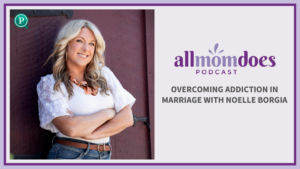She’s a young mom, holding down the fort on the home front and also chasing her writing career. And that writing career got all the more interesting when Jordan Feliz came calling and invited her to be part of his team for his new children’s book based on his song Beloved. Find out how Jes Woller discovered that the message of that song inspired her to evaluate how she sees her own life and relationship with God and what it means that you too are beloved by God on this inspiring conversation with AllMomDoes host Julie Lyles Carr.
Interview Links:
Jes’ Book: Beloved
Find Julie: Online | Instagram | Facebook | Twitter | Pinterest
AllMomDoes: Instagram | Facebook | Twitter
Transcription:
Purposely your life, God’s purpose. Listen at onpurposely.com.
Julie Lyles Carr [00:00:14] Today on the AllMomDoes podcast, I am your host, Julie Lyles Carr and my guest got to have a really unique experience, something that I think a lot of you are going to relate to that just sounds like a whole lot of fun. So we’ll get into that here in just a second. But first I want to introduce her. I want you to meet Jes Woller. Jes, thanks so much for being on the podcast today.
Jes Woller [00:00:34] Thank you so much for having me.
Julie Lyles Carr [00:00:35] Absolutely. So give our listener a little window into your life. Where do you live? Do you have kids? Do you have a dog? You know, all that kind of stuff.
Jes Woller [00:00:45] Sure. I do have four wonderful children. They are super close in age, so I have five, seven, eight and ten year old right now. Two of them are upstairs because one of them was sick today. And so they’re watching a movie and we’re just making it work as as moms have to do in this life. I work …
Julie Lyles Carr [00:01:06] Exactly.
Jes Woller [00:01:07] I live and work in Milwaukee. My husband and I love Milwaukee, but we have been all around the world. We lived in China for a couple of years. We were both in Minnesota for a while. So that’s part of our lives too, is that we like to bounce around a lot. Yeah, I’m a school secretary and I am also a children’s book author, and I’m getting my master’s degree right now in clinical mental health counseling. I teach Bible studies and Sunday school. I kind of try to just seize every opportunity God puts in front of me and speaks to me. And and I have got quite an eclectic resume, if you will.
Julie Lyles Carr [00:01:45] You absolutely do. I love that. You got to have as part of that resume a really interesting experience recently. You got to author a book on behalf of Jordan Feliz, a children’s book based on his song Beloved, which is this beautiful love song to his daughter, Jolie. And of course, I love Jordan Feliz. We’ve had him on the show. We’ll have Rebecca put that interview in the show notes. He’s just such an incredible guy. I myself have done some children’s books, and it’s a very different experience than some of the other nonfiction and fiction that I’ve written. So talk about your journey into doing children’s books and how that feels a little bit different than maybe some of the other mediums and formats that you’ve been involved in?
Jes Woller [00:02:31] Oh, that’s a great question. So I actually published a children’s book prior to my work on Beloved, and it’s called Miraculous Debut, and I wrote it when I was pregnant with my fourth. And I was just contemplating how big it is and how surreal it can be to just have this human inside of you with so much potential and all the love that you have and you don’t know what their future is going to be like. And so I had all of these thoughts and so I put them on paper. And about two years later, I finally published Miraculous Debut, and that was my first children’s book experience. And so that kind of got my foot in the door here with Beloved. And writing this book for children is so special because you really need to pack a lot of meaning into a few words and you need to create interest and setting and character and work with an illustrator who can bring it to life. And you don’t want to hit them over the head with the meaning necessarily and preach at them. But it’s so important to translate some of those values and the importance of your story. And so it’s careful work to put a children’s book into the hands of little ones who will hopefully enjoy it and get some meaning out of it.
Julie Lyles Carr [00:03:52] So just talk to me about this journey that you went on in writing this book, because I know for myself, when I begin to work on a project, when I begin to work on a topic, there are times that there’s something that I don’t necessarily think I’ve got an issue with or I think I’ve conquered pretty well, or I’ve got some things that I can help someone else with and that I’ll discover, oh, oh, okay. Because, you know, I am the oldest child of two younger brothers, so I’ve got the whole oldest child, oldest and only daughter thing. I’ve got a certain number on some of the personality tests that tells me a lot about my need to, you know, want people to approve and be happy and to not disappoint anyone and to do all the right things and to perform blah, blah, blah. So how was that for you? What kind of self-discovery did you make as you went on this journey of writing this book of Beloved?
Jes Woller [00:04:40] Oh boy, There’s two big things that I think I want to mention. And first of all, I felt so unqualified. I am nobody. Jordan Feliz has all these followers and listeners, and I kept going back to why am I qualified to write this book? I’m not good enough for someone more experienced to be writing this. And then I looked at my manuscript and I looked at what I had been writing, like, Oh, really? That’s who God uses. God only uses and values the people who have qualifications. No, that’s not how God works. So that was a huge lesson for me to just go back again and again. God will use who He uses and he values you not for what you have done from worldly measures, but how he wants to put you out into the world and send his message. The other interesting thing that came up is how my children, you know, react all the time and how they seek my approval or want my praise or what I have, you know, subconsciously trained them to do. And those behaviors that they think that I want them to perform and then how they see my value or my love increase when they do them. Like, no, no, no, I don’t. I don’t want them to feel loved when they’re good or loved when they’re kind or loved when they’re, you know, accomplishing these things. That’s not it. I love them all the time. And so it was such a good reminder on that plane to just to think as a parent, what am I praising them for? When am I showing them my love? And how can I make sure that they know that they are loved by me and loved by God regardless of their behaviors and accomplishments?
Julie Lyles Carr [00:06:24] Right. And I think that it’s tricky because, of course, we want our kids to be kind and act in ways that are good for them. Because let’s face it, when we do engage in behaviors in a certain way, it can lead to some great consequences in our life and we engage in some behaviors in other ways it can lead to really bad consequences. And and there is that place Jes that I feel like sometimes in our messaging surrounding our faith, we can lean so hard into one side that we almost make it seem like it doesn’t matter then how we live our lives. And yet our lives are supposed to be a response to grace. They’re supposed to be that thing that flows out of us because we understand the grace of Christ. So it’s not that you and I are here saying our kids don’t need to have any standards or they don’t need to know the ways that really are pleasing and wise. Let’s talk about wise ways to live.
Jes Woller [00:07:18] Yes.
Julie Lyles Carr [00:07:19] But boy, do I think it is key to establish first that for ourselves, for our kids, that we are beloved, that it doesn’t have to be this thing completely attached to how well we’re accomplishing the report card. As I told you in going through this series on going deeper in my spiritual faith, I’m one of the first ones to think that I need to attach some kind of activity to what that means, what it means to go deeper. What has it meant to you, particularly in the process of doing this introspection about this messaging around Beloved? Where are some areas that you’ve realized that you may have things in a little bit of a reverse order where you may still be trying to achieve or accomplish, or talk God into loving you a certain way rather than starting from that bedrock of you are beloved?
Jes Woller [00:08:12] Oh, that’s such a wonderful question. You know, it’s always this prayer of mine, that God will use me. Use me. Lord, use me in your world. Use me for your ways. I’m a clay vessel. I’m yours. Use me, use me, use me. And sometimes I let that prayer get so carried away that I feel like if he’s not actively using me in a really obvious way, then I’m not doing my job and I’m not fulfilling his purpose and therefore that I’m not loved. And so if I am not teaching Bible studies and I’m not teaching Sunday school and I’m not, you know, nailing every devotion with my kids and responding appropriately as a mother, that I’m failing him to the point where, you know, I am just a disappointment and I’m not doing it right. And to be always reminded and go back to this, the message of the song, the message of the story, that his love for me, that how he values me is not tied to that. It is not tied to my behaviors and is not tied to my accomplishments. And I should, out of gratitude for the things that he has done for me, for dying on the cross and out of the hope of heaven, you know, keep our eyes, press on towards the goal, you know, keeping that goal in mind. Those things should motivate me to want to be useful and to act appropriately and to raise my children well and to always, always go back to my faith and the importance of it as it permeates through my entire life, not just Sunday mornings or the 10 minutes in the morning I give to a devotional or whatever it is, but always in every action and every word. And so, yeah, I just always want to remind myself and everyone that that it’s not tied, your value and your love, the love of God is not tied to those things that you do, however well motivated you might be.
Julie Lyles Carr [00:10:13] Right. Right. Absolutely. You tap into something that I think is a really important part of the conversation, which is when we are doing those things in obedience that we feel that God has called us to do, and yet no one else has seen it. How for some of us, the way we’re wired, if we particularly have a love language of needing words of affirmation, but nobody’s really seen what we’re doing, so we’re not getting that external and that that outside of ourselves kind of validation for this thing that we’re doing, or we may be engaged in something that we had hoped that would really reach a lot of people. And yet it doesn’t seem to be having that kind of reach. And then we’re questioning if we actually did the thing that God wanted us to do. You know, I taught for a period of time when I was still on staff at a church, a message about are we willing to be sort of obscure? I mean, where with people in that if obedience means that, are we willing to serve in that way? And I think that’s a really hard thing in our lives today. And I tell you Jes I think it’s going to be a hard thing in some of the lives of our kids who are wired to be more outwardly needing that validation because the avenues like social media, the avenues like being the first one to raise your hand in class, all of those kinds of things, we really prime ourselves and our kids have been primed for these external moments of showing that we’re doing the right thing, that we’re trying to do it right. And so I wonder how you wrestle that. I think of the two examples that are given of people praying on the the guy praying on the street corner and really like proclaiming all the things he’s done and on and on and on versus the guy who’s just quietly in his prayer closet before God. Yet we live in a culture that seems to really love to broadcast the good stuff. So how do we balance that? What are some of the self checks we need to do in terms of motivation, in terms of being content, even if no one else sees? How do you wrestle that?
Jes Woller [00:12:18] Boy, I wish I had an easy answer for you. I have. I have wrestled with humility, you know, for years and just truly in my heart, praying that God will teach me that it’s not about me and that it’s not about my accomplishments. And it’s, you know, and the things that I do, the writing that I have done. You know, I’ve also written a lot of devotional blogs or things like that. And what am I drawn to? What do I want to see first thing that next morning? How many like shares does it have? And that is not the way that we determine our value. And we just need to trust. Trust, trust. Trust. The Holy Spirit. The Holy Spirit is who works. And we don’t know at what point someone could come across what we’ve written or what we have done and that it will move their hearts and, you know, and the Holy Spirit will work through that. But if we’re only in it for the praise, for the acknowledgment, for the affirmation, I am also a big affirmation lady. Then we are, you know, give give so that your right hand is or your left hand doesn’t know what your right is doing right. And if that’s what we’re giving to God, then are we just doing it for people to acknowledge us and for us to feel valuable? And boy, that is a slippery slope because then we are gaining value in what we’ve done. And wow, I am good at this and not wow God is good. And so and so, so many times we might have the opportunity to just pray. Lord, are you teaching me humility right now? Is that what this is about? Is this, are you just reminding me that that my eyes and my heart should be on you and not me and not my like button and not the share button and not, you know, those things that we see and are, like you said, trained to watch for being intentional and cognizant of that. And reminding our children to will be such a huge thing in this life.
Julie Lyles Carr [00:14:26] Right. Right. For helping them be able to at least see the divide that sometimes is between walking in obedience, walking in an understanding of value before God. And that isn’t always attached to everyone’s opinions and to the likes and the follows and all of the things. I think that’s such a powerful thing to highlight there. You bring up something that I think we sometimes miss, which is the humility it takes to receive that you are beloved because it means we haven’t done anything to be beloved. We are just who we are as we were created to be. Because a lot of times I can feel myself striving to want to be at the front of God’s classroom. You know that somehow it’s still dependent on my efforts. So talk to me about the relationship that you see, particularly through the process of putting this book together and the messaging for that. Do you think that a level of humility and yet a deeper understanding of what it means to be beloved by God are interconnected?
Jes Woller [00:15:35] Oh, yeah. I love the topic of humility. Boy, I love the topic of humility. And and the biggest thing I love about humility is just the reminder that humility is not about thinking less of ourselves. It is about thinking of ourselves less. And you might have heard that before, but we wrap ourselves in these claws of either like self-deprecation sometimes, like, No, oh, I’m not good enough, and they’re better. And that’s not what humility is. That’s not what humility is at all. It’s saying, I wrote a book that’s doing well because God wanted it to do well, and God gave me the gift and the opportunity to write it, and it’s got nothing to do with me. There’s a beautiful little C.S. Lewis quote about, you know, humility is seeing someone else paint the Sistine Chapel and being just as amazed and in awe as you would be if you had painted it yourself. It’s not about, is it me and am I proud of how well I did? It’s being able to appreciate how God is working in the world, what he’s accomplishing, what he’s doing, how he’s working, who he’s working through is not the focus. It’s not who he’s doing it and how valuable they are by their own efforts. It is just really valuing what God can do and how blessed we are to be part of that sometimes is really kind of how I feel about it.
Julie Lyles Carr [00:17:05] Yeah. How do you teach to your kids this convergence of humility and being beloved and then also putting in place that thing that says and because I’m beloved, these are behaviors I will accept and these are behaviors I won’t toward me because I’m a beloved child of God. And I’m speaking within the pail of Jesus, talking about turning the other cheek. I mean, the things we need to do in humility, not stay picking at the fight, you know, being the first one to apologize, those kinds of things. And yet sometimes, just as I think we’ve gotten over in the ditch on one side where we’ve said I’ve got to accomplish the status of being worthy of being beloved by God. The other side of the ditch can be sometimes this place where we think, well, we just have to let everybody just run us down and that somehow that’s being humble, but that’s not actually honoring the place where God has told us we’re beloved. So how do we manage all of that balance where we have the humility to turn the other cheek. We have the humility to not be picking at people. But at the same time, to protect what God wants us to have, which is that sense that we are valued and we are his, how do we navigate that?
Jes Woller [00:18:27] You know that that’s a great question too and I do what I approach how I approach that with my children. We do a lot of debriefing. We do a lot of, you know, somebody in an argument or something happened at school or somebody gets picked on or whatever it might be, and we really sit and talk about how did you feel, how did they feel, what do you think they wanted and who you know and then go back to and God loves you and God loves them. And what might he have been teaching you in those moments? And just boy, we do, we really hash it out. And maybe that’s the counselor in training. Maybe that’s my master’s degree coming out is is really discussing all of the elements at play there. But it is important to acknowledge how we feel about something and how it’s not okay for people to hurt us or say certain things. And yet, you know, it’s also important to forgive as God forgives. And it is important to acknowledge that we are beloved children of God, and so are they. And, and and we often look at how we could have handled things differently next time. So we really try to go over the issues that might have come up and you know, so it’s so good to pray about it with your kids and see what they bring up. You know, what the Holy Spirit is encouraging them to to speak about, because that is an element, too, because God works so powerfully through even these little ones who we think we’re so much more knowledgeable than than they are. Right. I know the Bible better. I know the Bible stories, I know the theology, whatever it might be. But sometimes those little parts can just speak such truth in prayer that we can often learn from them.
Julie Lyles Carr [00:20:19] Right. This idea of doing a debrief with your kids I think is beautiful. And you highlight something that I think is very important, particularly for a lot of us who kind of feel like we can be Mama bears, which is to point out also the belovedness of the other party involved, which is also to be looking for the lesson that God was teaching, even if our kid has done absolutely nothing wrong. I mean, and this is a hard thing to do if you feel like your kid’s been bullied or you feel like your child has been the butt of someone’s joke and here you are, is the parent wanting to go, They’re a jerk. You’re fabulous. And and hey, I’ve said it, I’ve done it. You better believe it. But I love this rounding out of the message of being beloved that we are all beloved by God, all of us, even the person who was a jerk to you, even the person who hurt your feelings, even the person that you just don’t get along with because of a personality clash. How important it is to recall that just as beloved as we are individually, God also calls them beloved. How does that grind sometimes for you? Because, man, I got to say, there are things I find it sometimes a little easier for myself Jes to stay in that state of mind like, and God loves them too. But boy, when it comes to our kids, that can be really tough to be reminding them that, yeah, that jerk on the playground is also beloved by God. Yeah.
Jes Woller [00:21:42] It does. It does take a lot of discipline, doesn’t it, to bring yourself back there and you know, and you don’t want to, you don’t want to belittle their pain either, Right?
Julie Lyles Carr [00:21:52] Right.
Jes Woller [00:21:53] You want them to know that you care as a mom. So there is that. But I have been so blessed. My husband, you know, we’ve been happily married for 16 years and we have, you know, four beautiful children. And I just can’t help but wonder sometimes with those bullies or those people who, you know, have done things that affected my children negatively, that that has caused some hurt. And I just wonder, you know, are they facing circumstances that are difficult and have caused them to to feel this pain and act out this way? And I just, do they need my prayers? Do they need it? Do they not have the same blessings that I have? And to hope that my children can show forgiveness and have had an opportunity to grow resilience and just think about, you know, I don’t know what’s happening at home. I don’t know what’s happened in their past and give them the benefit of the doubt that this is maybe a consequence of some difficulties that they have faced. And just to feel blessed to be in a home and in a family that doesn’t speak to each other that way or is quick to forgive or knows not to, you know, hit or name call, which we’ve all gone through the phase with our young children. And so, you know, to have the humility again to look back and say, okay, okay, we’ve we’ve made poor choices, and so this is someone else making a poor choice. But I’ve been forgiven. And I can forgive them, too, because the things I’ve been forgiven in the eyes of God are a lot bigger than what this person might need to be forgiven for, you know, what they’ve done to my child. And does Mama bear get real, Mama bear? She sure does. She feels big. She feels hard. But. But she needs to be an example for her children. And so being able to take a deep breath and talk about it calmly in a way that reflects Christ’s love and forgiveness and acknowledges again that forgiveness that we’ve received can be a huge example to our children.
Julie Lyles Carr [00:24:06] That’s so beautiful. Well, Jes I am just so excited for you with the release of this book with Jordan Feliz again, such an awesome guy, such a beautiful song. I may have called it Beloved at the top. I apologize. It’s beloved. It’s beloved. And see, I’m still beloved even if I did it wrong. So right. So where can our listeners find out more about you, about the book? Where can they find you in all of the places, social, all the stuff?
Jes Woller [00:24:30] Oh, boy, I’m still building that platform. I’m going to be honest. I’m a pretty green little lady here as far as my writing. I do have a website that I’m working on. It’simportanttocare, and it’s still a tiny URL right now, but more importantly, Jordan’s book. Jordan, JordanFeliz.com/beloved is where you can find his book. And I’m still kind of working on my name and how to navigate all of that. So don’t look for me, look for Jordan right now. You know and just always pray that his work and his message will get out there, too, and that we can all be reminded of these beautiful things that he’s teaching us and how God’s working through him.
Julie Lyles Carr [00:25:17] Yeah, absolutely. And we’re going to have him back on the show here soon. And again, hopefully Rebecca can get that link to his interview in the show notes so that listeners can find it there. Well, Jes thank you so much for joining me today. We navigated some fun little issues with technology. We got through it, we hung in there. And that is usually a message to me that this is going to be a really important conversation for our listeners to hear. And any time we run up against some of those roadblocks, I’m like, There’s going to be something real good in here that somebody needs. So Jes, thanks for your patience on all of that and all the best to you. Congratulations again on such a beautiful book.
Follow this podcast:







